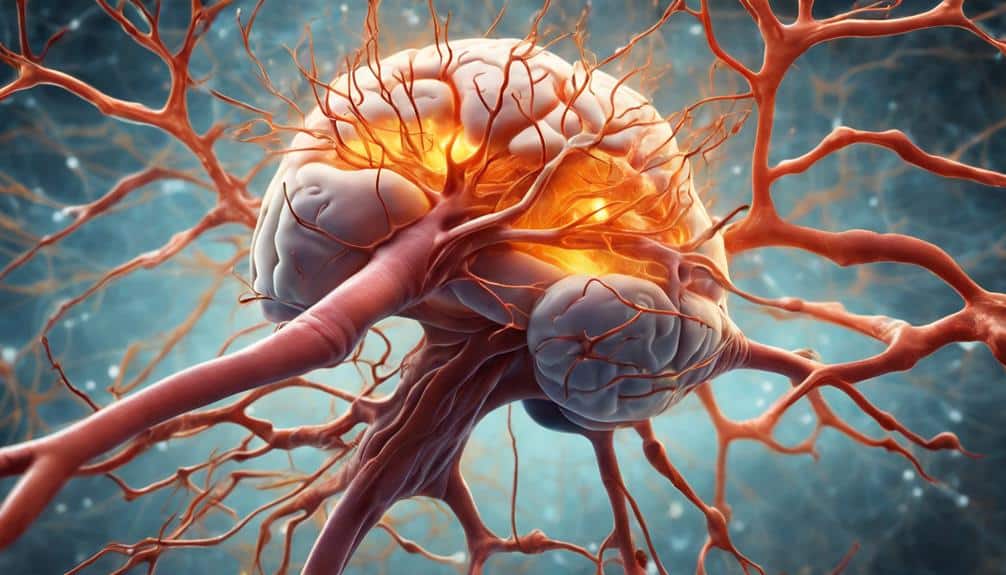Ashwagandha for Adhd
As I navigate through the intricate web of potential natural remedies for managing ADHD symptoms, a particular herb stands out like a beacon of possibility: Ashwagandha. Its reputation as an adaptogen and its historical use in Ayurvedic medicine intrigue me.
Could this ancient herb hold the key to alleviating some of the challenges associated with ADHD? Join me as we explore the unfolding research and investigate deeper into the mechanisms behind Ashwagandha's potential benefits in addressing ADHD.
Key Takeaways
- Limited direct evidence supports Ashwagandha for ADHD treatment.
- Historical use and stress-reducing properties suggest potential benefits.
- Regulates brain chemicals linked to stress and anxiety.
- Antioxidant and anti-inflammatory effects may support cognitive health.
What Is Ashwagandha's Role in ADHD?

Despite the lack of scientific evidence specifically supporting its effectiveness for ADHD treatment, ashwagandha has been historically utilized in traditional Indian medicine for a range of health benefits. As an herbal remedy, it's derived from the Withania somnifera plant and is often considered a natural treatment option for various conditions, including attention deficit hyperactivity disorder (ADHD).
While research on ashwagandha has primarily focused on its potential benefits for anxiety and cognitive function, its role in ADHD management remains unclear. Some studies suggest that ashwagandha's active compounds, such as withanolides, may have properties beneficial for brain health, similar to those found in medications for anxiety and depression.
However, more in-depth research is needed to determine the efficacy of ashwagandha specifically for children with ADHD. Before considering ashwagandha as part of an ADHD treatment plan, it's important to consult a healthcare provider to confirm its safety and appropriateness for individual needs.
Research on Ashwagandha for ADHD

While scientific evidence supporting Ashwagandha's efficacy for ADHD treatment is limited, research has shown promising potential in other areas of mental health and well-being. Studies have indicated that Ashwagandha, a herb deeply rooted in traditional Indian medicine, may offer benefits for conditions like anxiety and cognitive function. Research conducted in 2016 and 2012 demonstrated positive effects on mental health and overall well-being.
This herbal remedy contains withanolides, which are similar to active compounds found in medications for anxiety and depression. These compounds are believed to work by reducing brain chemicals associated with stress and anxiety. However, more extensive research is required to determine the specific effectiveness of Ashwagandha in treating ADHD symptoms.
While the preliminary findings are encouraging, further studies focusing on ADHD are essential to establish Ashwagandha's role as a potential treatment option for individuals struggling with this neurodevelopmental disorder.
Mechanism of Action of Ashwagandha

Ashwagandha's mechanism of action primarily involves withanolides, the bioactive compounds responsible for its medicinal properties. These withanolides in Ashwagandha are akin to the active components found in medications used for managing anxiety and depression. The herb is believed to act on brain chemicals linked to stress and anxiety, potentially helping to alleviate symptoms.
Additionally, Ashwagandha exhibits antioxidant and anti-inflammatory properties, which play a role in its overall health benefits. Through its actions on the body, Ashwagandha is known to reduce stress levels, enhance focus and concentration, and even improve the quality of sleep.
- The interaction of withanolides with brain chemicals can aid in reducing feelings of anxiety and stress.
- The antioxidant effects of Ashwagandha may contribute to its ability to improve focus and concentration.
- The anti-inflammatory properties of the herb could potentially help in alleviating symptoms of depression.
Health Benefits of Ashwagandha for ADHD

An Ayurvedic herb like Ashwagandha may offer potential health benefits for individuals with ADHD. While scientific evidence directly supporting Ashwagandha for ADHD is limited, its historical use and stress-reducing properties make it a promising natural remedy.
Ashwagandha contains compounds such as withanolides that could help regulate brain chemicals associated with stress and anxiety, potentially enhancing focus and concentration in those with ADHD. Additionally, its antioxidant and anti-inflammatory effects may support cognitive health, contributing to overall well-being in individuals with ADHD.
When considering natural treatments for ADHD, incorporating Ashwagandha into a holistic approach that includes omega-3 fatty acids, mindfulness practices, exercise, adequate sleep, and a balanced diet can be beneficial. These complementary strategies aim to manage ADHD symptoms effectively, emphasizing the importance of seeking professional advice for personalized treatment plans.
Potential Side Effects of Ashwagandha

Considering the health benefits of Ashwagandha for ADHD, it's important to be aware of potential side effects associated with its use. When using Ashwagandha, individuals should be cautious as adverse effects may occur. Here are some key points to take into account:
- Gastrointestinal issues: Side effects such as diarrhea and stomach upset are common with Ashwagandha use, impacting the digestive system and causing discomfort.
- Allergic reactions: Allergies to Ashwagandha can trigger serious reactions, emphasizing the need for careful monitoring, particularly in those prone to sensitivities.
- Drug interactions: Ashwagandha can interact with certain medications, underscoring the necessity of consulting healthcare providers before incorporating it into your regimen.
Being mindful of potential side effects like vomiting, liver problems, and the risks for individuals with high blood pressure or hyperthyroidism is important to ensure safe and effective use of Ashwagandha for managing ADHD symptoms.
Frequently Asked Questions
How Much Ashwagandha Should I Take for Adhd?
For ADHD, the recommended ashwagandha dosage varies based on individual factors. Consult a healthcare professional before starting. Follow product label directions and consider interactions with medications. Clinical studies are limited; long-term effects, benefits for children, and user experiences require further research.
What Herbs Are Good for ADHD Focus?
When seeking herbs for ADHD focus, I find ginseng beneficial, enhancing cognitive function. Rosemary aids concentration, lemon balm calms, peppermint boosts alertness. Ginkgo biloba supports memory, Bacopa monnieri attention, Rhodiola rosea cognition. Turmeric promotes brain health, Gotu kola sharpens focus, and Holy basil offers stress relief.
What Are Natural Stimulants for ADHD Adults?
Coffee alternatives, exercise, mindfulness, diet changes, sleep, meditation, cognitive therapy, stress management, herbal supplements, and natural remedies are ways to manage ADHD naturally. They offer holistic approaches that can complement traditional treatments for better outcomes.
Does Ashwagandha Help With Focus?
Like a focused beam of light cutting through darkness, mindfulness techniques, cognitive exercises, and lifestyle changes can enhance attention and focus. Incorporating these practices into daily routines can lead to improved cognitive performance.
Conclusion
To sum up, while research on the use of ashwagandha for ADHD is limited, its potential benefits in reducing stress and improving overall well-being are promising.
The mechanism of action of ashwagandha, with its withanolides compounds, may offer therapeutic effects similar to conventional medications.
Despite minimal side effects, further studies are needed to fully understand its role in managing ADHD symptoms.
Like a ray of sunshine breaking through the clouds, ashwagandha shows potential in providing natural support for individuals with ADHD.







